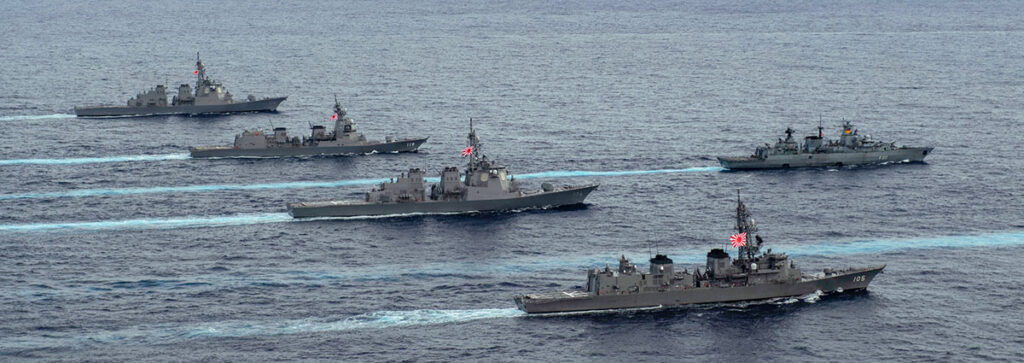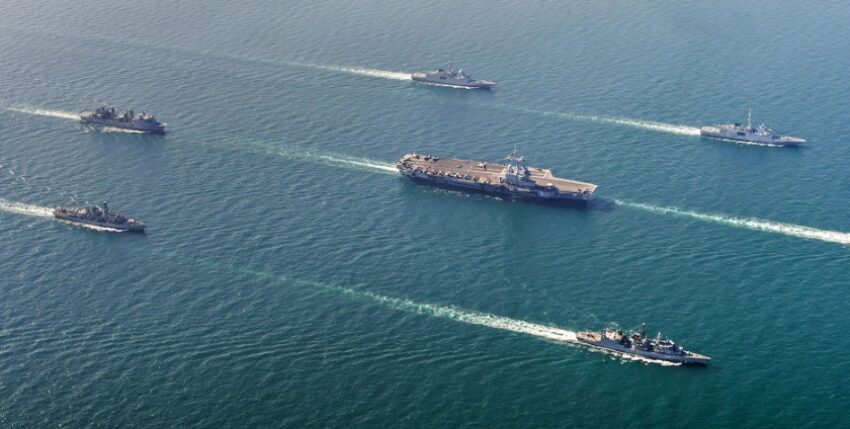Its flexibility makes the navy the ideal instrument of German foreign policy. A plea in favour of deploying ships wherever they are needed - worldwide.
To all appearances, the navy currently serves one main purpose and will continue to do so for the foreseeable future: to deter Russia on the northern flank of the alliance. As an initial reaction to Putin's invasion of Ukraine, this impulse is understandable, but harbours great risks - risks for German foreign policy and for the navy itself. Unlike during the Cold War, the Federal Republic is no longer the smaller West Germany. Moreover, the traditional allied naval powers no longer have the resources or the will to take over the protection of German interests and the rules-based international order without restriction.
Despite all pious hopes, it will be difficult for the German fleet to combine the operational commitments in the northern flank area with a significant presence beyond its own home waters. A unit scheduled for year-round deployment would tie up three times the number of ships in maintenance and training - assuming good maintenance work. However, as there is a shortage of ships and personnel in the fleet, two corvettes and three frigates permanently deployed on the northern flank translate into almost everything the navy currently has available in terms of larger ocean-going combat ships that can be deployed worldwide.
To plan as if the navy's tasks - even in the West's rivalry with Russia - lie exclusively in Europe fails to recognise both the central importance of sea lines of communication - both militarily and economically - and the much more comprehensive contribution that navies can make to foreign policy. The strong focus on Europe and the deterrence of Russian aggression in the immediate neighbourhood makes sense above all for the army and air force. However, since these branches of the armed forces, which are focussed on combat on land, dominate the strategic culture and day-to-day policy of the Bundeswehr in terms of numbers, this could also explain the current course of the navy.
The world does not stop being complicated, creating crises and posing challenges for German foreign policy just because Russia has exposed itself as a violent aggressor in its immediate neighbourhood. On the contrary, it makes things even worse. One of the biggest concerns for which answers need to be found in global politics is directly linked to Russia's expansionist policy - and far outshines it in terms of potential consequences: The rise of China in conjunction with a possible escalation of the Taiwan issue. In order to influence highly dangerous cost-benefit considerations in the right direction, clear signals from as many important international partners as possible are needed at an early stage. If Germany is not even able to remove a single large warship from the strategic tunnel vision of the North and Baltic Seas, how credible does its willingness to impose painful sanctions on a distant potential aggressor and provide effective support to a defender on the other side of the world appear?
According to recent surveys, fear of an attack by Russia ranks well behind concerns about economic stability, the rising cost of living and climate change among German citizens. In contrast to the army and air force, the navy is also always directly challenged with regard to these higher-prioritised concerns of the population.
Beyond the classic military and diplomatic tasks and the protection of sea routes - ensuring order at sea, which is indispensable for the global economy - another irreplaceable contribution of the navy to Germany's responsibility in the world must not be forgotten: The protection of the planetary ecosystem is inextricably linked to the protection of the seas. The navy is Germany's strongest executive arm on the high seas. Beyond Germany's coastal waters, it is indispensable in enforcing international agreements on the sustainable and equitable use of the oceans.
Back to the "golden age"?
The navy always has to explain itself, needs a lot of resources and has too little of everything: ships, ammunition, spare parts and personnel. However, it makes nothing easier and fails to recognise the overall strategic risks and the situation of the navy when some people in naval uniform think they are already on the way back to the supposedly "golden age" of the Cold War. There is no doubt that in the years since the annexation of Crimea, the navy has found it difficult to reconcile international deployment obligations with intensive training programmes to strengthen its credible deterrent capability. However, it is a fallacy to conclude that one of the two is better or worse for Germany and the navy. Both are needed - especially now. The ability to fight is the essence of naval forces, while their valuable contribution to foreign policy is by no means limited to war scenarios.

If the navy had not demonstrated its value for a German foreign policy focussed on global responsibility with its missions in recent decades, it would probably hardly still exist. In purely quantitative terms, the army has barely a fifth of its tanks, the air force only a third of its aircraft, but the navy still has half of its ships. In addition, the navy in particular can boast massive qualitative growth. Today it has a fleet whose units are significantly more modern, larger, more powerful and more globally deployable than those with which it left the 1980s behind. The development is already evident in the increase in tonnage - see the future frigate 126 in 10,000-tonne cruiser format. This is well illustrated by the example of submarines: The six existing Class 212A submarines currently deployed worldwide together displace more tonnage than all 18 of the old Class 206(A) boats optimised for the North and Baltic Seas.
The relative share of total personnel - and therefore also of the character and culture of the Bundeswehr - has also increased for the navy since 1990: it has doubled from 6.7 per cent to over 15 per cent. As the navy is more dependent on higher qualifications - and therefore ranks - than the army, the effect is even greater. In addition, the increasing appreciation of German politicians - especially the respective German chancellors - led to a disproportionately high proportion of naval personnel in foreign missions, at times up to 30 per cent. In addition, the navy has far fewer heads than the army at a comparable command level (comparison frigate/battalion). Since command experience abroad promotes careers, the Navy's deployment workload translates into influence that its representatives can gain nationally and internationally.
Beyond the budget, there is a further danger for the personnel situation of the navy if it fails to emphasise its special strategic role in politics and the public and to promote global maritime thinking. The poor performance of the navy in the special fund of the "turnaround" can also be interpreted as a sign of a relapse into continental thinking in the Federal Republic. If Germany's security is once again thought to be limited to the immediate neighbourhood, why should potential recruits from the interior of the republic choose the navy of all things for their personal contribution to protecting the country? According to its own assessment, the navy has already exhausted what can be achieved in terms of young people in Germany's maritime coastal regions. In view of Germany's global role, it could appeal to young people much more broadly in terms of their sense of responsibility - because this goes far beyond limited deterrence strategies.
Search for balancet
As far as dealing with both Russian aggression and much broader global challenges is concerned, a division of labour would be appropriate for Germany in military terms: The army and air force focus on the defence of the alliance in Europe, while the navy maintains and strengthens its focus on the world. Because right now, Germany, Europe and NATO cannot afford for smouldering crises to escalate in other, supposedly distant but critical places. If, for example, important European energy supplies were to be obstructed or interrupted by sea - whether in the Gulf of Guinea, the Horn of Africa or the Strait of Hormuz - Europe's ability to hold out would be weakened and Russia's negotiating position strengthened.
The sense of such a division of labour - in addition to rapid global mobility and comparatively low financial and political costs - arises from the great flexibility of the navy as an instrument of foreign policy. It is possible to reach over two thirds of the earth's surface on the high seas without diplomatic hurdles, while a frigate in the Indian Ocean only ties up slightly more budgetary resources than in the North Sea. Above all, however, the same frigate with the same equipment and training can switch between different roles within a very short space of time. It can encourage a potential aggressor to behave well, protect people and interests, enforce values and international law if necessary - against potentates, warlords and pirates. But it can also provide rapid humanitarian aid in the event of natural disasters, evacuate large numbers of people or supply them with relief supplies. And unlike tanks or combat aircraft, warships can also be used for diplomatic receptions. Due to their versatility, naval forces are a sign of a state's presence, interest and ability to act - either clearly visible or hidden behind the horizon, depending on the situation.
For warships, it is not only their specific task in a mission that counts, but also the significance of their position relative to geographical regions in which German foreign policy can benefit from their signalling effect and ability to act. A ship in the Horn of Africa could bring benefits even with the current low level of piracy. Its mere presence would make attacks on merchant ships even less likely, while at the same time it could react very quickly to an escalation in the Strait of Hormuz or provide humanitarian aid more quickly in the Indo-Pacific.
In order to face up to its responsibilities in the world and to respond to international crises and threats to European maritime supply lines, Europe cannot do without naval power - and without Germany, European naval power is unthinkable. Today, neither France nor Great Britain are in a position to deploy large naval forces without the participation of their allies. If the German Navy remains in its home waters, it will be missing elsewhere. The light, flexible, cost-effective and low-risk navy, which can be deployed anywhere in the world, is a valuable instrument of a German foreign policy that must not close its eyes to the world despite the war in Ukraine.
Kapitänleutnant Dr Moritz Brake is a Senior Fellow at the Center for Advanced Security, Strategic and Integration Studies (CASSIS) at the University of Bonn and a member of the German Maritime Institute.
Moritz Brake








